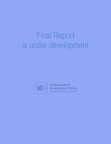Samoa has been receiving GEF funds since the GEF's pilot phase. It was selected for country portfolio evaluation because it represents two groups of countries that are highly relevant to the GEF; small island developing states (SIDS) of the Pacific, and least developed countries (LDCs). Also, it…
Country Portfolio Evaluation (CPE) Samoa
Country Portfolio Evaluation (CPE) Philippines
The Philippines is one of the largest recipients of GEF support, with allocations in both climate change and biodiversity, and a well-established GEF Small Grants Programme. The environment sector is an essential part of the country's sustainable development agenda.
Conclusions…
Annual Performance Report (APR) 2006
The GEF Third Annual Performance Report (APR) 2006, presented and prepared by the GEF Evaluation Office, focuses on completed projects for which terminal evaluations were submitted during fiscal year 2006. The full report provides an assessment of project outcomes, project sustainability,…
Country Portfolio Evaluation (CPE) Costa Rica
Costa Rica was the site of the pilot CPE. The country was selected because of its broad GEF portfolio, the types of GEF support, the engagement of implementing and executing agencies and the country's long experience with environmental issues. The success of this pilot evaluation convinced the…
Guidelines for GEF Agencies in Conducting Terminal Evaluations 2008
When a project is closing, the Implementing or Executing Agency conducts a terminal evaluation. The main purpose of such evaluations is to review the implementation process and achievement of results and draw lessons.
The Guidelines for Terminal Evaluations provide…
Evaluation of Incremental Cost Assessment 2007
Incremental cost is the fundamental operational principle of the GEF. The GEF funds the increment, or additional costs associated with transforming a project with national/local benefits into one with global environmental benefits. The principle of incremental cost was originally envisaged to…
Joint Evaluation of the GEF Activity Cycle and Modalities
In June 2005, the GEF Council welcomed the proposed evaluation to assess the efficiency of the GEF activity cycle and modalities, and underscored that efforts to improve the cycle had so far not succeeded: "the project cycle elapsed times are still too long." The evaluation was approved as a…
Experience of Executing Agencies under Expanded Opportunities in the GEF
In 1999, the Global Environment Facility (GEF) Council approved expanded opportunities to undertake GEF projects for seven Executing Agencies (ExAs): the Asian Development Bank, African Development Bank, European Bank for Reconstruction and Development, Food and Agriculture Organization of the…
Evaluation of the Catalytic Role of the GEF
The catalytic role of the GEF is reflected in the GEF Operational Strategy (OS, 1994) as one of 10 Operational Principles for the development and implementation of the GEF Work Program. This evaluation points the difficulties in implementing and assessing this principle and explores in more…
GEF Capacity Development Activities
Capacity development is a major priority within the global environmental conventions. This evaluation assessed the capacity activities and modalities supported by the GEF.








